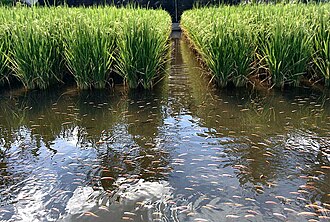
Back ধান-মাছ ব্যবস্থা Bengali/Bangla سامانه برنج-ماهی Persian Rizipisciculture French Mina padi ID Pirinç-balık sistemi Turkish

A rice-fish system is a rice polyculture, a practice that integrates rice agriculture with aquaculture, most commonly with freshwater fish. It is based on a mutually beneficial relationship between rice and fish in the same agroecosystem. The system was recognized by the FAO in 2002 as one of the first Globally Important Agricultural Heritage Systems.
The benefits of rice-fish systems include increased rice yield, the production of an additional (fish) crop on the same land, diversification of farm production, increased food security, and reduced need for inputs of fertilizer and pesticide. Because fish eat insects and snails, the systems may reduce mosquito-borne diseases such as malaria and dengue fever, and snail-born parasites such as the trematodes which cause schistosomiasis. The reduction in chemical inputs may reduce environmental harms caused by their release into the environment. The increased biodiversity may reduce methane emissions from rice fields.